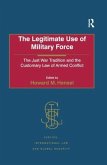The Right Not to Use the Internet
Concept, Contexts, Consequences
Herausgeber: Kloza, Dariusz; Lievens, Eva; Ku¿elewska, El¿bieta
The Right Not to Use the Internet
Concept, Contexts, Consequences
Herausgeber: Kloza, Dariusz; Lievens, Eva; Ku¿elewska, El¿bieta
- Gebundenes Buch
- Merkliste
- Auf die Merkliste
- Bewerten Bewerten
- Teilen
- Produkt teilen
- Produkterinnerung
- Produkterinnerung
This pioneering collection addresses the prospective fundamental/human right not to use the internet and the challenges that the non-use of the internet poses for democracy.
Andere Kunden interessierten sich auch für
![Public Opinion and the International Use of Force Public Opinion and the International Use of Force]() Philip Everts (ed.)Public Opinion and the International Use of Force168,99 €
Philip Everts (ed.)Public Opinion and the International Use of Force168,99 €![The Legitimate Use of Military Force The Legitimate Use of Military Force]() The Legitimate Use of Military Force168,99 €
The Legitimate Use of Military Force168,99 €![The Use of Force in UN Peacekeeping The Use of Force in UN Peacekeeping]() The Use of Force in UN Peacekeeping167,99 €
The Use of Force in UN Peacekeeping167,99 €![The Economics of Feasible Socialism The Economics of Feasible Socialism]() Alec NoveThe Economics of Feasible Socialism167,99 €
Alec NoveThe Economics of Feasible Socialism167,99 €![Metropolitan Water Use Conflicts In Asia And The Pacific Metropolitan Water Use Conflicts In Asia And The Pacific]() Metropolitan Water Use Conflicts In Asia And The Pacific18,99 €
Metropolitan Water Use Conflicts In Asia And The Pacific18,99 €![Ethics and the Use of Force Ethics and the Use of Force]() James Turner JohnsonEthics and the Use of Force186,99 €
James Turner JohnsonEthics and the Use of Force186,99 €![The European Union and the Use of Military Force The European Union and the Use of Military Force]() Tommi KoivulaThe European Union and the Use of Military Force185,99 €
Tommi KoivulaThe European Union and the Use of Military Force185,99 €-
-
-
This pioneering collection addresses the prospective fundamental/human right not to use the internet and the challenges that the non-use of the internet poses for democracy.
Produktdetails
- Produktdetails
- Verlag: Routledge
- Seitenzahl: 278
- Erscheinungstermin: 24. April 2025
- Englisch
- Abmessung: 240mm x 161mm x 20mm
- Gewicht: 584g
- ISBN-13: 9781032866314
- ISBN-10: 1032866314
- Artikelnr.: 72177141
- Herstellerkennzeichnung
- Libri GmbH
- Europaallee 1
- 36244 Bad Hersfeld
- gpsr@libri.de
- Verlag: Routledge
- Seitenzahl: 278
- Erscheinungstermin: 24. April 2025
- Englisch
- Abmessung: 240mm x 161mm x 20mm
- Gewicht: 584g
- ISBN-13: 9781032866314
- ISBN-10: 1032866314
- Artikelnr.: 72177141
- Herstellerkennzeichnung
- Libri GmbH
- Europaallee 1
- 36244 Bad Hersfeld
- gpsr@libri.de
Dariusz Kloza is a postdoctoral researcher at the Faculty of Law of UCLouvain Saint- Louis Bruxelles, Belgium. El¿bieta Küelewska is Associate Professor at the Faculty of Law of the University Bialystok, Poland. Eva Lievens is Associate Professor of Law and Technology at the Faculty of Law and Criminology of Ghent University, Belgium. Valerie Verdoodt is a postdoctoral researcher at the Faculty of Law and Criminology of Ghent University, Belgium.
Introduction Part 1: The concept and its consequences 1. Ethical
meditations for a human right to an analogue life 2. An attempt to
conceptualise the right to access the internet and its impact on the right
not to use it 3. Framing the right not to use the Internet 4. Human Rights
and Digital Divide: Recent developments in the Case Law of the Belgian
Council of State 5. Is There a Right to be Offline 'For No Reason' in
France? 6. The Right Not to Use the Internet: Towards a Negative Digital
Freedom in Polish Law 7. Non-Use of the Internet as human rights enabler?
The curious cases of the right to privacy and the right to health 8.
Digital Disconnection as a Plight or Right? A Manifesto to Re-Imagine
Digital Disconnection as a Reasonable Accommodation Part 2: Contexts 9.
Right not to use the internet: Lessons to be learned from the right not to
be subject to automated decisions 10. The meaning of the limitation of the
use of the Internet for criminal punishment from the perspective of
extended mind thesis 11. Digitalization in Public Services in Belgium:
Enshrining the right not to use the Internet in the Constitution 12. Is the
dematerialisation of public services an elective progress? A sociological
analysis of the (non)uses of older people in France 13. The Ethics of
Choosing Not to Use the Internet: A Comparative Case Study of the Education
and Healthcare Sectors in Slovakia and Sweden 14. The right not to use
Internet to play videogames 15. An exploration of the child's right not to
use the internet: disentangling from the digital web
meditations for a human right to an analogue life 2. An attempt to
conceptualise the right to access the internet and its impact on the right
not to use it 3. Framing the right not to use the Internet 4. Human Rights
and Digital Divide: Recent developments in the Case Law of the Belgian
Council of State 5. Is There a Right to be Offline 'For No Reason' in
France? 6. The Right Not to Use the Internet: Towards a Negative Digital
Freedom in Polish Law 7. Non-Use of the Internet as human rights enabler?
The curious cases of the right to privacy and the right to health 8.
Digital Disconnection as a Plight or Right? A Manifesto to Re-Imagine
Digital Disconnection as a Reasonable Accommodation Part 2: Contexts 9.
Right not to use the internet: Lessons to be learned from the right not to
be subject to automated decisions 10. The meaning of the limitation of the
use of the Internet for criminal punishment from the perspective of
extended mind thesis 11. Digitalization in Public Services in Belgium:
Enshrining the right not to use the Internet in the Constitution 12. Is the
dematerialisation of public services an elective progress? A sociological
analysis of the (non)uses of older people in France 13. The Ethics of
Choosing Not to Use the Internet: A Comparative Case Study of the Education
and Healthcare Sectors in Slovakia and Sweden 14. The right not to use
Internet to play videogames 15. An exploration of the child's right not to
use the internet: disentangling from the digital web
Introduction Part 1: The concept and its consequences 1. Ethical
meditations for a human right to an analogue life 2. An attempt to
conceptualise the right to access the internet and its impact on the right
not to use it 3. Framing the right not to use the Internet 4. Human Rights
and Digital Divide: Recent developments in the Case Law of the Belgian
Council of State 5. Is There a Right to be Offline 'For No Reason' in
France? 6. The Right Not to Use the Internet: Towards a Negative Digital
Freedom in Polish Law 7. Non-Use of the Internet as human rights enabler?
The curious cases of the right to privacy and the right to health 8.
Digital Disconnection as a Plight or Right? A Manifesto to Re-Imagine
Digital Disconnection as a Reasonable Accommodation Part 2: Contexts 9.
Right not to use the internet: Lessons to be learned from the right not to
be subject to automated decisions 10. The meaning of the limitation of the
use of the Internet for criminal punishment from the perspective of
extended mind thesis 11. Digitalization in Public Services in Belgium:
Enshrining the right not to use the Internet in the Constitution 12. Is the
dematerialisation of public services an elective progress? A sociological
analysis of the (non)uses of older people in France 13. The Ethics of
Choosing Not to Use the Internet: A Comparative Case Study of the Education
and Healthcare Sectors in Slovakia and Sweden 14. The right not to use
Internet to play videogames 15. An exploration of the child's right not to
use the internet: disentangling from the digital web
meditations for a human right to an analogue life 2. An attempt to
conceptualise the right to access the internet and its impact on the right
not to use it 3. Framing the right not to use the Internet 4. Human Rights
and Digital Divide: Recent developments in the Case Law of the Belgian
Council of State 5. Is There a Right to be Offline 'For No Reason' in
France? 6. The Right Not to Use the Internet: Towards a Negative Digital
Freedom in Polish Law 7. Non-Use of the Internet as human rights enabler?
The curious cases of the right to privacy and the right to health 8.
Digital Disconnection as a Plight or Right? A Manifesto to Re-Imagine
Digital Disconnection as a Reasonable Accommodation Part 2: Contexts 9.
Right not to use the internet: Lessons to be learned from the right not to
be subject to automated decisions 10. The meaning of the limitation of the
use of the Internet for criminal punishment from the perspective of
extended mind thesis 11. Digitalization in Public Services in Belgium:
Enshrining the right not to use the Internet in the Constitution 12. Is the
dematerialisation of public services an elective progress? A sociological
analysis of the (non)uses of older people in France 13. The Ethics of
Choosing Not to Use the Internet: A Comparative Case Study of the Education
and Healthcare Sectors in Slovakia and Sweden 14. The right not to use
Internet to play videogames 15. An exploration of the child's right not to
use the internet: disentangling from the digital web









